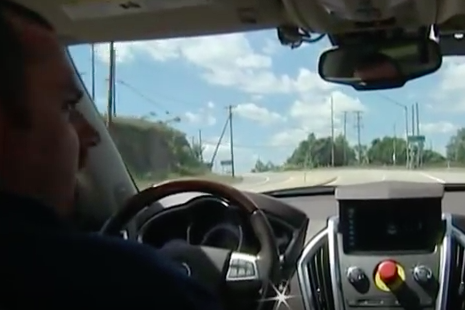
June 01, 2016
 Source/YouTube
Source/YouTube
Carnegie Mellon University's self-driving 2011 Cadillac SRX.
Pennsylvania legislators, PennDOT officials and transportation industry leaders convened in Pittsburgh on Wednesday to pledge the state's ongoing commitment to the development of autonomous vehicles, which they believe represent the future of travel safety, mobility and environmental protection.
The event, held before the first official meeting of the Autonomous Vehicles Testing Policy Task Force, was intended to outline legislative goals and review the progress of current research and development efforts.
“We are always looking at ways to make travel safer, and these new vehicle technologies offer a huge opportunity to not only advance our network but also reduce human behavior as a factor in crashes,” said PennDOT Secretary Leslie S. Richards. “We’re looking forward to expanding on the innovation that’s already alive and well here in Pittsburgh so companies can test their technologies in our state’s varied seasons and roadway types.”
At Wednesday's event, faculty and students from Carnegie Mellon demonstrated the latest advancements in autonomous vehicle technology, developed by the university over more than 30 years of dedicated research. The university ultimately aims to ensure that self-driving cars will be safe, affordable and accepted by the public.
To date, they've created more than 14 generations of self-driving vehicles, including a 2011 Cadillac SRX that can navigate ramps, merge onto highways and cruise at 70 mph by itself. Researchers and advocates for self-driving cars say that, in addition to increasing road safety, the technology will provide a means of independence for older and disabled citizens.
Earlier this year, Uber announced that it will construct a test track for self-driving cars at its Almono research facility in an effort to advance Pittsburgh's Monongahela Riverfront redevelopment. The company will partner with Carnegie Mellon on the initiative as it works to keep pace with other companies — Google, Tesla, Apple and Ford — that are competing for the long-term future of transportation.
"The concept of autonomous cars is something many of us never thought we'd be discussing in our lifetime," state Sen. Jay Costa said. "What's exciting to me is that right here in Pittsburgh, we're in the center of where this innovation is happening at places like Google, Uber and, most importantly, here at Carnegie Mellon University."
Several state lawmakers in attendance also celebrated Pittsburgh's selection among seven finalists for the U.S. Department of Transportation's Smart City Challenge, which supports urban efforts to fully integrate innovative technologies. With $40 million in funding available to the winner, legislators discussed the benefits of Senate Bill 1268, a piece of legislation that would provide a framework for controlled automated vehicle testing.
“I am delighted to see Pittsburgh and CMU taking a leadership role in autonomous vehicles and hope today’s event shows our commitment to supporting this groundbreaking research. The work being done at CMU is a source of pride for not only Pittsburgh but the entire Commonwealth of Pennsylvania,” said state Sen. Randy Vulakovich. “By working with all of the stakeholder groups, I believe SB 1268 will foster innovation while at the same time ensure the safety of motorists on our public roads.”